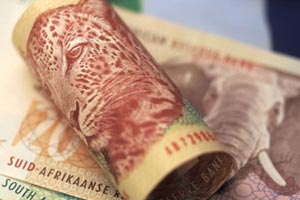
THE weakening of the South African rand against the United States dollar is making locally produced goods less competitive in the market, an economist has said.
By Our Correspondent
The rand’s value has been steadily falling since last year, fluctuating between R10 and R12 to the US$1.
Speaking in Bulawayo, Zimbabwe National Chamber of Commerce (ZNCC) economist, Kipson Gundani said the weakening of the SA rand against the US dollar was contributing to locally produced goods becoming expensive, forcing local consumers to shun them.
“If we look at our trade pattern, our biggest trade partner is South Africa. Seventy-five percent of our products go to South Africa and if we look at the distortion in the exchange rate between the US dollar and the rand, there is a scenario where the rand is weakening up against the US dollar and that puts Zimbabwe at a disadvantage,” he said.
“The depreciation of the rand against the US dollar makes the South African products more competitive.”
Zimbabwe’s import bill for the six months to June stood at US$2,9 billion as the country’s lack of competitiveness makes it a dumping ground for foreign products.
Currently, a number of public institutions, businesses and individuals are beginning to abandon the use of the South African rand, as the value of the neighbouring currency continues to weaken.
- Chamisa under fire over US$120K donation
- Mavhunga puts DeMbare into Chibuku quarterfinals
- Pension funds bet on Cabora Bassa oilfields
- Councils defy govt fire tender directive
Keep Reading
Meanwhile, there is confusion over the use of Botswana coins with businesses and transport operators in Bulawayo now refusing transactions using the neighbouring country’s “old” coins.
Botswana announced the introduction of a new family of coins in February this year, replacing those that have been in circulation.
Botswana’s central bank reported the use of the old coins would cease with effect from August 28 2019 and advised members of the public to exchange the old coins at the nearest commercial bank by August 2014.
Botswana said, “the old coin will be exchanged only at the Bank of Botswana in Gaborone and Francistown for a period of five years until August 28 2019,” read a notice by the Bank of Botswana.
The phased out coins range from P1, P5, 5 thebe to 25 thebe.
A number of retailers are also no longer accepting the Botswana coins, with only a few still accepting them as a medium of exchange.
“At the moment, we no longer accept old Botswana coins since the introduction of new coins this year,” said a manager of a retailer giant on condition of anonymity.
Consumers spoken to said the refusal to accept the coins was posing serious challenges, especially when they required change.
Zimbabwe, which is battling a liquidity crisis and small change challenges, is importing rand coins for use in a multiple currency system which is dominated by the US dollar.











